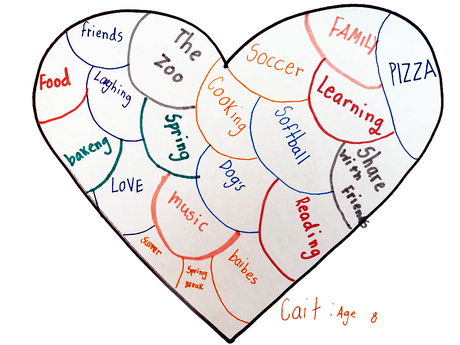While Social and Emotional Learning (SEL) has been around for a long time, it is quickly becoming one of the most talked about topics in education. If you’re like us, you’re probably thinking: IT’S ABOUT TIME.
If you are relatively new to SEL and Mindfulness, that’s great. We are here to guide you. But before we begin, can we just say: THANK YOU.
 Whether you are an educator or parent, the fact that you are reading a blog post about these topics means that you are interested in learning something to improve the lives of students. For that, we applaud you. Now, more than ever, educators are being called on to fill many roles.
Whether you are an educator or parent, the fact that you are reading a blog post about these topics means that you are interested in learning something to improve the lives of students. For that, we applaud you. Now, more than ever, educators are being called on to fill many roles.
In this moment, we know educators need support — not another directive, not another mandate, not one more thing on your plate. The good news is that SEL is not another educational fad. It’s not one more thing on your plate. It’s also not another thing you have to cram into your already busy schedule.
“Either we spend time meeting children’s emotional needs by filling their cup with love, or we spend time dealing with the behavior caused from their unmet needs. Either way we spend the time.” - Pam Leo, Connection Parenting
One realization brought on by these challenging times is that being able to manage our mind is more beneficial than merely cramming it with information. The days of rote memorization, drill and kill, stand and deliver, instruction are gone. Good riddance! They were boring.
The fact is those “sink-or-swim” approaches are simply not equitable, and they never have been. Also, here’s a question: Why on earth would we ever allow a child to sink?
As 21st century learners, our students need to be able to:
- Think creatively
- Work collaboratively
- Be innovative
These skills require taking risks, making mistakes, and working well with others. In short, they all require SEL skills.
What is Social and Emotional Learning (SEL)?
One of the most trusted sources for knowledge about high-quality, evidence-based social and emotional learning is The Collaborative for Academic, Social, and Emotional Learning (CASEL). They are basically the gold standard when it comes to all things SEL.
CASEL defines SEL as “the process through which children and adults understand and manage emotions, set and achieve positive goals, feel and show empathy for others, establish and maintain positive relationships, and make responsible decisions.”
Sounds pretty good, right?
CASEL identifies SEL’s five core competencies as: self-awareness, self-management, social awareness, relationship skills, and responsible decision-making.

Inter-related among the core competencies is the all-important work of equity. Educational Equity means that all students have access to the same resources and educational rigor despite race, gender, ethnicity, language, disability, family background, or family income (Jagers, et al. 2018).
SEL can be an important tool for advancing educational equity in that it can help schools:
- Promote understanding
- Examine biases
- Reflect on and address the impact of racism
- Build cross-cultural relationships
- Cultivate adult and student practices that create a more inclusive school community.
OK, now say this one with us: SEL starts with adults.
Why? Because we can’t teach what we don’t know. Teaching is stressful. You know it. We know it. Science knows it. Teaching has been recognized as one of the most stressful jobs in the United States (Herman 2019; Gallup, 2013). Herman’s work goes on to say that “we as a society need to consider methods that create nurturing school environments not just for students, but for the adults who work there.” Preach!
One of the best ways to destress is MINDFULNESS.
What is Mindfulness?
 Mindfulness is paying attention to the present moment without judgment. It is sometimes confused with meditation which refers to a more formal seated practice. No, you do not need to be sitting on a mountain under a waterfall to practice mindfulness. In fact, you can do it in your car in the Target parking lot if you want.
Mindfulness is paying attention to the present moment without judgment. It is sometimes confused with meditation which refers to a more formal seated practice. No, you do not need to be sitting on a mountain under a waterfall to practice mindfulness. In fact, you can do it in your car in the Target parking lot if you want.
Mindfulness practices help to train our minds to see ourselves and the world with greater clarity. It also gives our minds a rest from mental stimulation, especially when we are going through challenging times. Who doesn’t need that?
Research shows that mindfulness provides adults and children with skills to:
- Build attention
- Improve focus
- Manage stress
No equipment is required. No subscription. And, It’s FREE. Mindfulness enhances SEL. If SEL is the garden, mindfulness is the Miracle Grow. Here are some of our favorite SEL strategies that can be used with adults and students.
Calming Countdown
This mindfulness practice helps focus our attention, foster emotional awareness and promote self-management. Engaging with our senses helps bring our attention into the present moment. It allows our brain to “cool down” during moments of anxiety or escalation. Simply name:
- Five things you see
- Four things you hear
- Three things you smell
- Two things you touch
- One thing you taste
And voila! You’ve just practiced mindfulness.
HeART Projects
This activity supports students to identify what they love and value. Have students draw a large heart and ask them to write or draw things that they love. Feel free to show an example of a completed heart project like the one below. Next, you can have students share their hearts with a partner.

At the end of the day, SEL is not just some educational fad; it’s about human development. SEL skills lead to positive student outcomes and contribute to a greater sense of well-being.
Who doesn’t want that?
References
Cranston, A. (2019). Creating Social and Emotional Learning Environments, Shell Education.
Jagers, R., Rivas-Drake, D., Borowski, T. (2018). Toward Transformative Social and Emotional Learning: Using an Equity Lens. Establishing Practical Social Emotional Competence Assessments Work Group. Summary brief accessed here.
Herman, K.C., Reinke, W.M., & Hickmon, J. (2018). Empirically derived profiles of teacher stress, burnout, self-efficacy, and coping and associated student outcomes. Journal of Positive Behavior Interventions, 20- 90-100.
Lopez, S., Sidhu, P. (2013). U.S. Teachers Love Their Lives But Struggle in the Workplace. Article accessed here.
About the Authors
 Trisha DiFazio, M.A. Ed.
Trisha DiFazio, M.A. Ed.
Trisha DiFazio is an education consultant for Teacher Created Materials (TCM) and a former adjunct professor in the Rossier School of Education at the University of Southern California (USC). Trisha was also a contributing author on TCM’s Language Power: Building Language Proficiency series as well as Creating Social Emotional Learning Environments. She is passionate about empowering teachers and students around Social Emotional Learning as well as Culturally and Linguistically Responsive Teaching. Ms. DiFazio holds a Bachelor of Arts degree from Lake Forest College with a double concentration in English and Spanish, a Master of Arts in Teaching from National Louis University, an ESL Endorsement from Dominican University, and International TEFL Certification from the International Teaching Center in Madrid, Spain. As a result of studying with instructors from UCLA’s Mindful Awareness Research Center (MARC), Trisha has experienced firsthand how practicing mindfulness contributes to one’s overall health and sense of well-being.
 Allison Roeser, MHS, PCC, ALT
Allison Roeser, MHS, PCC, ALT
Allison Roeser, Master of Health Science (MHS) and Professional Certified Coach (PCC), is an SEL consultant and author for Teacher Created Materials (TCM). She has almost two decades of experience working with leaders in education, child welfare, and social change. With a Masters in Health Science from Johns Hopkins University, Allison’s thesis focused on increasing effective communication for early childhood educators in disadvantaged districts. Allison is currently the lead career success coach at SV Academy (voted one of the top education start-ups in 2020 by Fast Company) in addition to leading workshops and training courses for schools and Court Appointed Special Advocates (CASA), a program that advocates for foster care youth in San Francisco. Before becoming a coach, Allison was the Deputy Director at Westat, a research organization focusing on the National School Lunch and Breakfast Programs, in addition to developing leadership and life skills for underserved youth in Chicago public schools. As an avid learner of mindfulness practices, Allison has seen firsthand the value of integrating self-awareness into professional and personal development.
How Social Emotional Learning and Mindfulness can support Teachers and Students